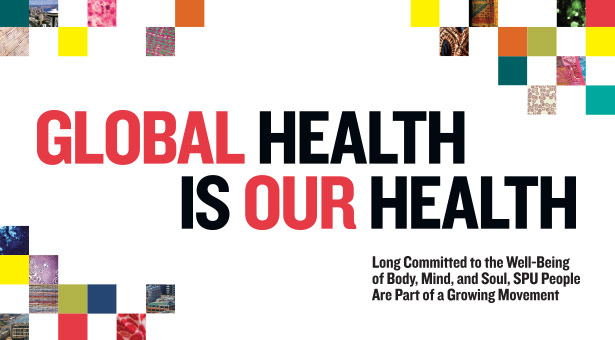
By Kathleen Braden
When a confirmed infectious disease pandemic breaks out, Seattle Pacific University’s emergency team swings into action, even if the outbreak is 7,000 miles away in Hong Kong. I participated in this type of campus plan when SARS (Severe Acute Respiratory Syndrome) began to move worldwide in 2003. Why was such a cautious response necessary?
The answer is that we know in today’s world, an infected person can travel around the globe in 36 hours. As real-time distance has diminished, global health has become … well, global. Even when someone is not directly impacted by an illness, the cost of poor health in lost labor productivity, social injustice, and political instability around the world affects all of us in this global economy.
Because the field of global health is defined by transnational action planning, it draws in not only medical expertise but also people who understand culture, political organization, economics, engineering, business, human rights, law, psychology, social structure, and logistics. My students are often pleased to learn that they can make a difference, even if they do not have a degree in a medical profession.
The field also looks for much more than extending longevity; quality of life is an important consideration. In my “Introduction to Global Development” class, we learn about campaigns to deter smoking, the need to stop violence against women, the increasing obesity epidemic we are witnessing as people around the world adopt our Western fast-food culture, and even reasons poor people are at greater risk during natural disasters such as earthquakes.
“We all benefit when the people of the planet thrive.”
Fortunately, there are plenty of success stories. The World Health Organization released a report this year that we have seen remarkable progress as maternal deaths have dropped dramatically in developing countries and infant mortality has decreased with the advent of vaccination and clean water campaigns. Appropriate-level technology that can deliver a sterile environment for childbirth to villagers in Nepal saves the lives of mothers and babies. Low-cost and low-tech systems to filter water can help children in a Guatemalan village avoid the ravages of dehydration and constant diarrhea. Education outreach that is sensitive to local culture can help girls and women make healthy choices about their bodies. And the connection between faith practices and well-being are so clear now that one academic publishing house has created The Journal of Religion and Health.
Why has Seattle emerged to be a world leader in this comprehensive approach to global health? Something in the Northwest air breaks through conventional boundaries about health care. Innovators in this region value entrepreneurship, public–private partnerships, and original thinking to solve health dilemmas worldwide.
In part, we are witnessing the timely convergence of Seattle institutions: the Bill and Melinda Gates Foundation, the University of Washington Medical Center and Department of Global Health, multiple research facilities such as Seattle BioMed, and nonprofit organizations such as PATH, which bases its work on innovation combined with local collaboration. Christian nonprofits include World Concern, with programs for health care and emergency services; World Relief, assisting new immigrants to the city with access to needed health care and social services; and, of course, World Vision, one of the largest nonprofit providers of sustained health care outreach in the world.
These organizations come together under umbrella groups such as the Washington Global Health Alliance, Global Washington, and the information-outreach organization Humanosphere. During the summer of 2012, Seattle Pacific participated in the Global Health Nexus program at Seattle Center, a showcase of local brainpower and energy to meet challenges for global health. Economic reports verify that all these activities have become a major employment-generator for the Puget Sound area — a recent University of Washington study measured the contribution of income to Washington state from global health activities to be over $4 billion. But the benefits of being a “global health nexus” go far beyond jobs. The relationship between public health, social stability, and the reduction of conflict is demonstrable, so we all benefit when the people of the planet thrive.
It is no surprise that Seattle Pacific has embraced the exciting changes taking place in the field. After all, our institution’s nursing program was founded back in 1936 on principles to safeguard the well-being of the whole person, body and soul. Academic programs with the flexibility of an interdisciplinary approach, the expertise of our faculty, and an institutional membership in Global Washington all create an important role for us in the new field of global health. Additionally, the advantage of location and networking allows student interns to be placed in dynamic organizations around the city, opening the door to invaluable experience.
The SPU community is embracing the challenges ahead. Even as health rates improve for people in many parts of the globe, our own country faces uncertainty with the growing gap between rich and poor. Human well-being is part of an interrelated social fabric, and change does not happen without cultural engagement that includes public policy, geopolitics, and economics.
For Christians, restoration to wholeness is built into the very fabric of our faith, so we each might be inspired to ask “What can I do for this new 21st-century vision of a healthy world?” The good news is that the field of global health is very democratic. Here are ways you can be involved:
Learn! You have access to reports and websites that will take you right into the action: If you’d like to start with a resounding success tale, search for the Carter Center’s guinea worm eradication program.
Donate! Most nonprofits allow you to target your funds to specific health care needs or programs.
Volunteer! Even if you cannot commit on a regular basis, Seattle’s role as a global health nexus means that there are many exciting conferences that require volunteers to help out.
Explore your calling! No matter what your stage of life, you have experience and talent that is needed. In the work for global health, the people with stethoscopes need lots of partners.
 Kathleen Braden is professor of geography at SPU. She advises many students in the global development studies major, which is housed in SPU’s Department of Political Science and Geography.
Kathleen Braden is professor of geography at SPU. She advises many students in the global development studies major, which is housed in SPU’s Department of Political Science and Geography.
